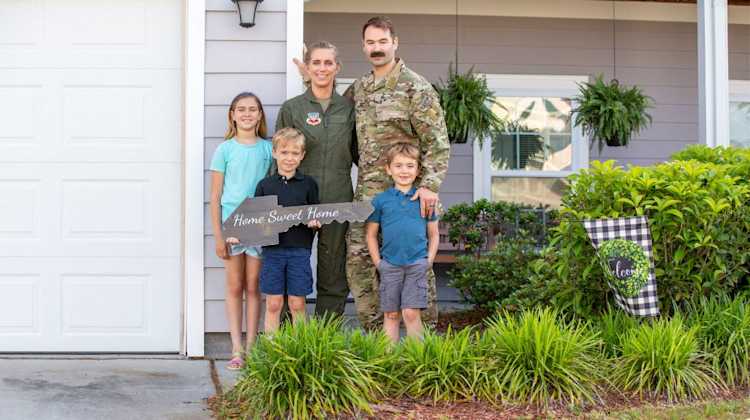PCSing and Privatized Housing: What you need to know
by PCSgrades - September 29th, 2021

DoD Updates on July 22:
The Marine Corps has a new MARADMIN from July 14: 396-20 Transportation and Housing when going to Japan. The only authorized transportation from US to Japan is by the Patriot Express, and commercial airlines are prohibited because of the quarantine process when moving to Japan.
Mailing packages: starting on August 13, you will not be allowed to use hand-written customs forms. You must use the online forms and have them pre-printed when using the Post Office.
A “shuttle” is a smaller box truck used to transport your Household Goods to a nearby moving truck when you live on a small street that won’t hold the 16-wheeler. The shuttles are authorized, but you should still receive a complete inventory for everything packed that day.
The GHC contract with TRANSCOM was supposed to transition in February, but a recent protest and GAO investigation has delayed the process 90 to 100 days, so the transition period will probably be moved closer to peak season next year, 2021. It is not impacting anything now, so we will keep an eye on those developments.
Our guest is Crystal Cornwall: the CEO and President of the Safe Military Housing Initiative. “We do micro and macro-level advocacy because we knew there was definitely a need to advocate for families as it relates to housing. It’s a cornerstone of family readiness. I’m a mom, wife to an active duty Marine, I work at a bank, and I’m finishing the last 2 classes of my Master’s!”
What got you started on this housing advocacy journey?
I personally got started on the journey when I experienced housing issues at Camp Pendleton. We had previously had issues at Keesler AFB in Mississippi. We had gone through the PPV, gov’t housing office, legal council, and my husband’s command, but there was no path to resolution. I ended up teaming up with Jean Coffman from Camp Pendleton. We discovered tangible systemic issues like mold, asbestos, and an overall culture of hostility to military members and their families. We are seeing change now, but that is what we observed at the time. We got in touch with Reuter’s through another military spouse, and through our work we connected with lobbyists in the Senate. We met with various leaders. What catapulted us to this was the Marine Corps family in the Reuter’s story that broke in November/December.
In our current environment with COVID and stop orders, there is a lot of uncertainty for military families. How are military housing companies working with families through this?
We know there are a bazillion moving parts for any PCS move. Families are saying that the Housing offices are working with them and being accommodating when orders are changed or delayed. Families are being allowed to extend leases, and companies are trying to open up houses and make them available if no one is leaving but new families are coming. The economic impact always falls on military families. Some families are stuck paying two mortgages or rents. It isn’t an easy solution.
If a family has to change their orders due to COVID and the local office isn't assisting, do they have any tenant rights?
We have to remember that these are joint venture contractual partnerships. Each branch of service has a heavy influence on how the Housing operation is administered. It isn’t always the PPV’s fault, everyone has a role in that. Some leadership is better than others. I have seen some changes in the PPV’s (not everywhere, but in pockets). We have to identify the successes so we can emulate that in other places. Every base and branch are different. Reach out to your local district office, or up to your regional office. The Navy and Air Force have hired housing advocates at the government housing offices. These are GS employees who should be objective. If you aren’t having success with your local and regional office, you can contact the national office at: NavyHousingHQ@Navy.mil. We have a 2-day turnaround on responses. The Army has a similar process. Start with district, then regional, then CNIC. Each PPV has a slightly different process and titles. If there is a moving or maintenance issue, especially if it is systemic, let the service member’s command know and don’t let them get blindsided. When you move, take photos of everything. Keep copies of everything, and fill out all paperwork for your housing office. We advocate for all couples and all situations, so reach out with specific questions.
What are some of the resources for families, especially those in financial hard spots due to COVID?
Military One Source has a great array of resources. We also have the Navy/Marine Corps Relief Society to offer grants and loans for financial assistance. Army Emergency Relief and the Air Force Aid Society all have similar programs and can help service members regardless of branch. If your family has to quarantine or stay behind, you could potentially get BAH at the current duty station so there won’t be a reduction, but you need to reach out to the command to get that organized. Reach out to Military One Source and the Aid Societies. (You can watch the PCSgrades webinar with representatives of the military aid societies here.)
Is there anything a military families should know when moving into on-base or on-post housing?
There is a tenant Bill of Rights AND a Tenant Bill of Responsibilities. We supported the Landlord/Tenant Bill of Rights, but we also support the Responsibilities piece. We try to be objective and support everyone. If something isn’t right, contact the chain of command and the local office. In the very worst cases, you can escalate concerns to us and to your Senate leaders. You need to take pictures and document everything. Make sure that you submit everything electronically. When people say they were charged thousands of dollars in move-out charges, they need some evidence to help protect them and defend their claim. Housing offices should be doing move-in and move-out inspections with you present. They should not be doing it without you there, unless you are in a state that is a red area for COVID. If you have the copies of photos and documentation, make a note of who you communicate with and the dates/times of your communications. Some PPVs are still blaming families for issues like water damage or mold if the house is cluttered or dirty. Don’t give them a reason to blame you. They are looking for reasons and excuses. So try to keep things uncluttered, document the damaged area.
There is a 3-step process for escalating housing issues, but sometimes each step takes multiple steps, so it can be exhausting and time-consuming. There are some who are very receptive to conversations and have made good progress listening to families.
What do families need to know when moving out of on-base or on-post housing?
You need room to room, wall-to-wall, ceiling to floor documentation. Take pictures of everything that may be charged: everything from carpets to blinds to trash cans. If you can’t afford to have someone help you clean, then just go through the housing checklist and make sure you are meeting all the requirements. Commands, families, and housing offices all need to know what to expect. Manage expectations, particularly in areas where there are high COVID issues. It’s important to have all your stuff together, cover your own arse, and don’t give Housing a reason to blame things on you.
Can a family push to be there at a move-out inspection?
It depends. In the case of Coronavirus, always defer to medical experts. But they should be doing a pre-moveout inspection to give you a heads up of what to correct and what you will need to take care of. The family should have a clear understanding of what is expected of them. The point is not to tell the family what they will be charged. The point is to let them know what they are responsible for fixing, and give them an opportunity to fix it and make it right. Some people may never have lived anywhere besides their parent’s house, so they may not know what is normal and what to expect.
Can a base deny housing while a family is on COVID quarantine?
That is not something that is currently happening, but if you are concerned with that, contact the Safe Military Housing Initiative. When you move, your TLA only covers specific days. If you are on Restriction of Movement, there may be specific funds you can apply for, but it depends if the ROM is in your home or at a hotel.
Some military spouses are afraid to speak up and disrespect authority. What should they do if they encounter housing issues?
We all expect spouses to be resilient, but this is a different generation. If you are afraid to stand up and ask a question, then find someone to ask it quietly. Attend the classes for spouses offered on your base. When you see something that is wrong, it doesn’t matter about your service member’s rank. You have to stand up and do what is right. If someone threatens that it will affect the service member’s career, that is retaliation– don’t let someone threaten you like that.






